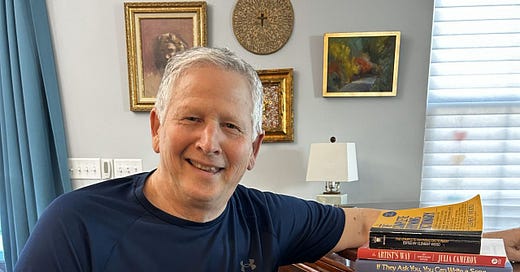I grew up an athlete—a jock as we said back in the 70s. I loved 60’s music—Beach Boys, Beatles, Motown, the harmonies of the Mama’s and the Papa’s—but those musicians, and even those in my high school, had a cool vibe I knew I could never approach. While I was trying to build and coordinate muscles, musicians were creating syncopation that sang to our hearts.
Visual art was distant to me. I didn’t know how to let it speak its language. I thought I was supposed to understand it and didn’t know where to begin. Let’s just say that art appreciation was a college elective I would have never chosen. And artist was a term I would never have dreamt to use to describe myself. I knew in my bones that if I tried, I would instantly be outed as a poser.
You’ll imagine my surprise then when at 68 years old, and pondering what to do for a retirement hobby, I decided to take up an art, namely piano, with a bent toward jazz and blues. My mom made me take lessons in grammar school, but I hated it. I played a bit in a Jesus band after my conversion to Christ in 1976, but I have never considered myself a musician. I had not seriously touched the keys for decades.
But I am learning it is never too late to create.
About a year ago, after taking online jazz lessons, I was bitten by a bug and given the most serious artistic itch of my life: writing lyrics.
This is odd on several levels, but not least is that a “singer-songwriter heart” would be stimulated in someone who can’t sing, who only plays adequately, and has no desire to perform.
What do you do with that?
You start writing. To help, you buy lots of books on songwriting. You purchase a rhyming dictionary, and a thesaurus. You find teachers on YouTube. You watch Netflix documentaries on the greats and listen to Malcolm Gladwell interview the legendary Paul Simon on Spotify audio books. You find coaches. You crave feedback.
You learn that lyrics are not written, they are rewritten. Which means you face down perfectionism, you crucify your ego, and you throw away lines you thought were good. You become childlike. You take on a beginner’s mind—which is unsettling for an old guy who, as a leader, has been conditioned to be right for his whole life. That kind of rightness does not cohere well to an artist’s heart.
What do you do with what you’ve written? You take the risk of putting it out there. Brian Wilson’s first songs were not hits. Same for McCartney and Lennon. First watercolors are not typically great either. But there is no better feedback than the real world.
So here goes…
In the sunset of my life
Came the dream for lyrics
For poetic and sonic verses
Talking to our troubled times
Healing hearts and holding out hope
Giving trembling masses tools to cope
Cohen, Cash, Simon, and Dylan
Suppressed fear of nasty boos
and kept creating in their old age
OG’s who knew song writers’ blues
Here’s the fear
I’m Father McKenzie
Writing the words of a song
No one will hear
No one will care
Or be drawn near
Cohen, Cash, Simon, and Dylan
Suppressed fear of nasty boos
and created in their old age
OG’s who knew song writers’ blues
Sometimes I wish
I could make the vision go away
of being Manilow and
joining our creative God
in writing the songs
that make the whole world sing
Cohen, Cash, Simon, and Dylan
Suppressed fear of nasty boos
and created in their old age
OG’s who knew song writers’ blues
The big vision came to me as a question: Can I leverage what I’ve learned by writing eight books, hundreds of articles, and more than 1,000 sermons in the service of lyrics? Can I, in less than 200 words, say important, edifying things in creative ways, ways that go beyond the ability of prose to touch the heart, soul, and mind?
It has been some of the most fun of my life to learn about image-rich and emotionally honest writing, song structure, meter and rhythm, rhyme scheme, and that lovely summarizing word: prosody. I might make that my retirement email address: seekingprosody@...
I don’t know where this will all go, and I’m trying not to pressure myself with those kinds of thoughts because they suppress the freedom of heart it takes to create. My agent told me once: There is no “there” in acceptance. I’m learning that the “there” is in play and in being priestly. That is to say, I am “there,” standing in the intersection of God, others, and our broken world—and from that vantage point making, creating, and generating.
The world needs beauty right now. It can cut through noisy clutter.
It's not too late for you to start creating.
Resurrection became visible at dawn. Easter reminds us that creativity can be found any day.
The OG’s were free and I’m tryin’ to sing harmony in their key.





This spoke to my heart. Thank you, +Todd! I also love the lyrics!
Fabulous! Made my day.